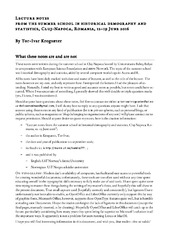| dc.contributor.advisor | Bones, Stian | |
| dc.contributor.author | Andersson, Magnus Brynildsrud | |
| dc.date.accessioned | 2021-11-05T12:10:55Z | |
| dc.date.available | 2021-11-05T12:10:55Z | |
| dc.date.issued | 2021-12-03 | |
| dc.description.abstract | Den avgrensede tematikken for avhandlingen er hvordan Norge bidro med å utmeisle en ny kyststatsrolle under FNs tredje havrettskonferanse (1973-1982), og hvordan dette befestet seg som en del av norsk havpolitikk i forhandlinger med nabostatene i Nordøst-Atlanteren og i bistandshjelpen gjennom 1980- og starten av 1990-tallet.
Avhandlingen legger vekt på at Norge var del av et internasjonalt fellesskap av kyststater som ønsket å oppnå bestemte rettigheter i sine havområder. Den norske delegasjonen inntok en medierende rolle under konferansen, og arbeidet i mindre grad med å sikre konkrete kyststatsinteresser.
Etter havrettskonferansen fortsatte den norske delegasjonen å arbeide for en universell tilslutning til traktaten. Dette ble gjort sammen med andre mindre og mellomstore stater. Dette er ikke blitt omtalt i senere litteratur.
I Nordøst-Atlanteren forhandlet Norge med nabostatene om hvordan havrettstraktaten skulle anvendes og ressursene fordeles. Jeg har sett forhandlingene samlet og beskriver hvordan Norge hadde et helhetlig perspektiv på forvaltningen av havområdet. Tidligere norsk forskning har i all hovedsak sett på forholdet mellom Norge og Sovjetunionen i rammene av den kalde krigen, men jeg viser at dette samarbeidet inngikk i et større kompleks av saker i kjølvannet av havrettskonferansen.
Havrettsarbeidet fikk også direkte konsekvens for deler av det norske bistandsarbeidet. Ettersom flere utviklingsland trengte hjelp med å forvalte de økonomiske sonene vokste en særegen havbistand fram. Denne hadde som mål å bidra til å bygge opp forskning og forvaltning i utviklingslandene. I tillegg bidro dette arbeidet til å befeste prinsippet om de økonomiske sonene internasjonalt, noe som også bidro til å styrke den norske stillingen i Nordøst-Atlanteren.
emneord: utenrikspolitikk, havrett, UNCLOS, havbistand, bistand. Friends of the Convention, Arbeidsutvalget for fisk, havpolitikk, Jens Evensen, fiskeriforvaltning, | en_US |
| dc.description.abstract | This thesis study the Norwegian positions during the third UN Conference of the Law of the Sea (1973-1982) and the aftermath in the bilateral negotiations with the other Northeast-Atlantic states until the signing of the UN Fish Stock Agreement in 1995. The main findings is that Norway, despite its clear maritime interests, played down the economic and territorial interests to ensure a universal ratification of the UNCLOS. It was possible because an overwhelming number of states advocated for a new regime with great privileges to Norway and other coastal states. The new regime were crucial when Norway established its economic zones in 1977. This laid the premise for negotiating with the other states in the Northeast-Atlantic in the 1980s. A second finding is that the fisheries agreements were a part of a widespread attempt to endorse the UNCLOS negotiations, and to emphasize the coastal states rights and distinct responsibilities in the Atlantic and Arctic oceans. A third finding is that the new maritime regime and the new coastal states status had a direct impact on the Norwegian development aid and laid the foundation of a new ocean aid to help the development countries with management of their new economic zones. | en_US |
| dc.description.doctoraltype | ph.d. | en_US |
| dc.description.popularabstract | This thesis study the Norwegian positions during the third UN Conference of the Law of the Sea (1973-1982) and the aftermath in the bilateral negotiations with the other Northeast-Atlantic states until the signing of the UN Fish Stock Agreement in 1995. The main findings is that Norway, despite its clear maritime interests, played down the economic and territorial interests to ensure a universal ratification of the UNCLOS. It was possible because an overwhelming number of states advocated for a new regime with great privileges to Norway and other coastal states. The new regime were crucial when Norway established its economic zones in 1977. This laid the premise for negotiating with the other states in the Northeast-Atlantic in the 1980s. A second finding is that the fisheries agreements were a part of a widespread attempt to endorse the UNCLOS negotiations, and to emphasize the coastal states rights and distinct responsibilities in the Atlantic and Arctic oceans. A third finding is that the new maritime regime and the new coastal states status had a direct impact on the Norwegian development aid and laid the foundation of a new ocean aid to help the development countries with management of their new economic zones. | en_US |
| dc.description.sponsorship | Utenriksdepartementets Arktis 2030-midler. HSL-fakultet har finansiert ett år. | en_US |
| dc.identifier.uri | https://hdl.handle.net/10037/22935 | |
| dc.language.iso | nob | en_US |
| dc.publisher | UiT Norges arktiske universitet | en_US |
| dc.publisher | UiT The Arctic University of Norway | en_US |
| dc.rights.accessRights | openAccess | en_US |
| dc.rights.holder | Copyright 2021 The Author(s) | |
| dc.rights.uri | https://creativecommons.org/licenses/by-nc-sa/4.0 | en_US |
| dc.rights | Attribution-NonCommercial-ShareAlike 4.0 International (CC BY-NC-SA 4.0) | en_US |
| dc.subject | Historie | en_US |
| dc.subject | VDP::Humanities: 000::History: 070::Modern history (after 1800): 083 | en_US |
| dc.subject | VDP::Humaniora: 000::Historie: 070::Moderne historie (etter 1800): 083 | en_US |
| dc.title | En kyststat trer fram - Norsk havpolitikk 1973-1995 | en_US |
| dc.type | Doctoral thesis | en_US |
| dc.type | Doktorgradsavhandling | en_US |


 English
English norsk
norsk



